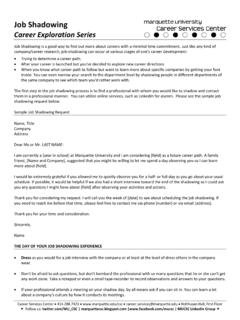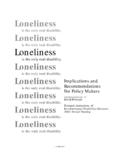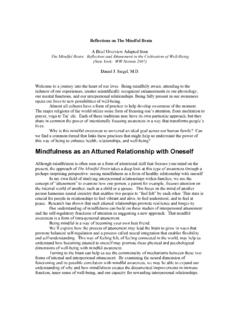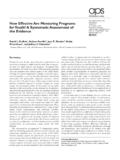Transcription of What do we know about them? - World Health …
1 Community Health workers: what do we know about them ? The state of the evidence on programmes, activities, costs and impact on Health outcomes of using community Health workers A report by Uta Lehmann and David Sanders School of Public Health University of the Western Cape Evidence and Information for Policy, Department of Human Resources for Health Geneva, January 2007 Community Health workers: what do we know about them ? Page iii Content Executive summary .. v Abbreviations .. vii vii Introduction ..1 Methodology ..2 The state of the evidence ..2 Defining community Health The history of community Health worker programmes ..5 Profiling community Health workers ..6 Who are they? ..6 Roles and activities ..8 Performance.
2 13 Health worker performance ..14 Use ..14 Impact effectiveness ..15 Cost-effectiveness of CHW programmes ..16 Managing CHW programmes ..17 Recruitment and selection ..18 Initial and continuing training ..19 Supervision and support ..20 Governance, ownership and accountability ..21 Community participation ..21 Relationships with the formal Health services ..23 Summary of lessons learnt ..26 References ..28 Community Health workers: what do we know about them ? Page iv Community Health workers: what do we know about them ? Page v Executive summary The use of community Health workers has been identified as one strategy to address the growing shortage of Health workers, particularly in low-income countries. Using community members to render certain basic Health services to the communities they come from is a concept that has been around for at least 50 years.
3 There have been innumerable experiences throughout the World with programmes ranging from large-scale, national programmes to small-scale, community-based initiatives. This review paper revisits questions regarding the feasibility and effectiveness of community Health worker programmes. It was commissioned by the World Health Organization as a follow-up to the World Health report 2006: working together for Health , which identified as a research priority the feasibility of successfully engaging community Health workers. This review aims to assess the presently existing evidence. It constitutes a desktop review, very broad in scope, as is evident from the title, which draws together and assesses the evidence as it can be found in the published and selected grey literature since the late 1970s.
4 The umbrella term community Health worker (CHW) embraces a variety of community Health aides selected, trained and working in the communities from which they come. Generalizations about the profile of community Health workers internationally are difficult. While there are some broad trends, CHWs can be men or women, young or old, literate or illiterate. More important is an acknowledgement that the definition of CHWs must respond to local societal and cultural norms and customs to ensure community acceptance and ownership. The roles and activities of community Health workers are enormously diverse throughout their history, within and across countries and across programmes. While in some cases CHWs perform a wide range of different tasks that can be preventive, curative and/or developmental, in other cases CHWs are appointed for very specific interventions.
5 While it is difficult, given the extensiveness of the topic and the diversity of the literature informing the review, to make generalizations about experiences with CHW programmes or answer the question of what makes a good CHW programme, there is consensus in the literature on a number of issues: First, CHWs can make a valuable contribution to community development and, more specifically, can improve access to and coverage of communities with basic Health services. There is robust evidence that CHWs can undertake actions that lead to improved Health outcomes, especially, but not exclusively, in the field of child Health . However, although they can implement effective interventions, they do not consistently provide services likely to have substantial Health impact, and the quality of services they provide is sometimes poor.
6 Second, for CHWs to be able to make an effective contribution, they must be carefully selected, appropriately trained and very important adequately and continuously supported. Large-scale CHW systems require substantial increases in support for training, management, supervision and logistics. Third, CHW programmes are therefore neither the panacea for weak Health systems nor a cheap option to provide access to Health care for underserved populations. Numerous programmes have failed in the past because of unrealistic expectations, poor planning and an underestimation of the effort and input required to make them work. This has unnecessarily undermined and damaged the credibility of the CHW concept. Fourth, by their very nature CHW programmes are vulnerable unless they are driven, owned by and firmly embedded in communities themselves.
7 Where this is not the case, they exist on the geographical and organizational periphery of the formal Health system, exposed to the moods of policy swings without the wherewithal to lobby and advocate their cause, and thus are often fragile and unsustainable. However, the concept of community ownership and participation is often ill-conceived and poorly understood as a by-product of programmes initiated from the centre. Evidence suggests that CHW programmes thrive in mobilized communities but struggle where they are given the responsibility of galvanizing and mobilizing communities. Community Health workers: what do we know about them ? Page vi Examples of successful programmes can thus be found in the wake of community mobilization efforts, either as part of large-scale political transformation, such as in Brazil or China; or through local mobilization, often facilitated by nongovernmental, community-based or faith-based organizations.
8 In many cases programmes last through the lifespan of the mobilization effort and wither or collapse entirely as the momentum of mobilization is lost. The rhythms and dynamics of community participation lie outside the scope of this review, yet are crucial to better understanding and discussing the future of CHW programmes. A key challenge lies in institutionalizing and mainstreaming community participation. To date, the largest and most successful programme in this regard is the Brazilian Family Health Programme, which has integrated CHWs into its Health services and institutionalized community Health committees as part of municipal Health services to sustain social participation. This means that community participation does not become an alternative, but an integral part of the state s responsibility for Health care delivery.
9 Fifth, the question of whether CHWs should be volunteers or remunerated in some form remains controversial. There exists virtually no evidence that volunteerism can be sustained for long periods: as a rule, community Health workers are poor and expect and require an income. Although in many programmes they are expected to spend only a small amount of time on their Health -related duties, leaving time for other breadwinning activities, community demand often requires full-time performance. The reality is that CHWs as a rule and by their very nature provide services in environments where formal Health services are inaccessible and people are poor. This also complicates the issue of community financing, which is rarely successful unless institutionalized, as in China.
10 Most of the evidence reflects failures of community financing schemes, leading to high drop-out rates and the ultimate collapse of programmes. Given present pressures on Health systems and their proven inability to respond adequately, the existing evidence overwhelmingly suggests that particularly in poor countries, CHW programmes are not a cheap or easy, but remain a good investment, since the alternative in reality is no care at all for the poor living in geographically peripheral areas. While there is a lot to learn, there is a lot we do know about making programmes work better: appropriate selection, continuing education, involvement and reorientation of Health service staff and curricula, improvement supervision and support are non-negotiable requirements.


















